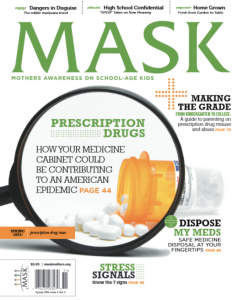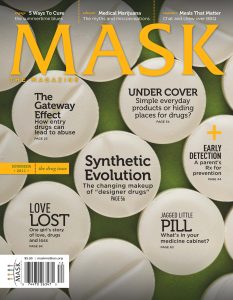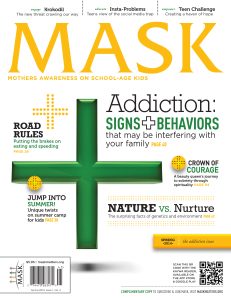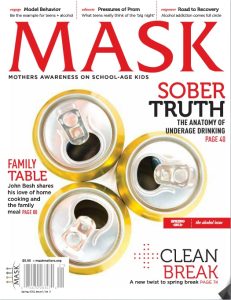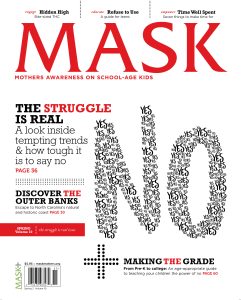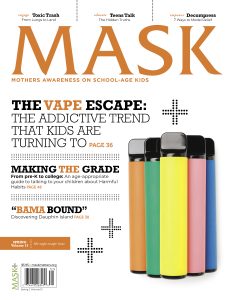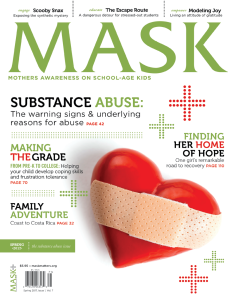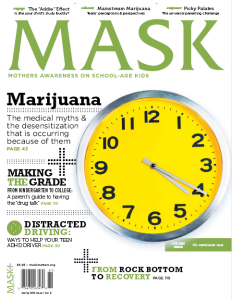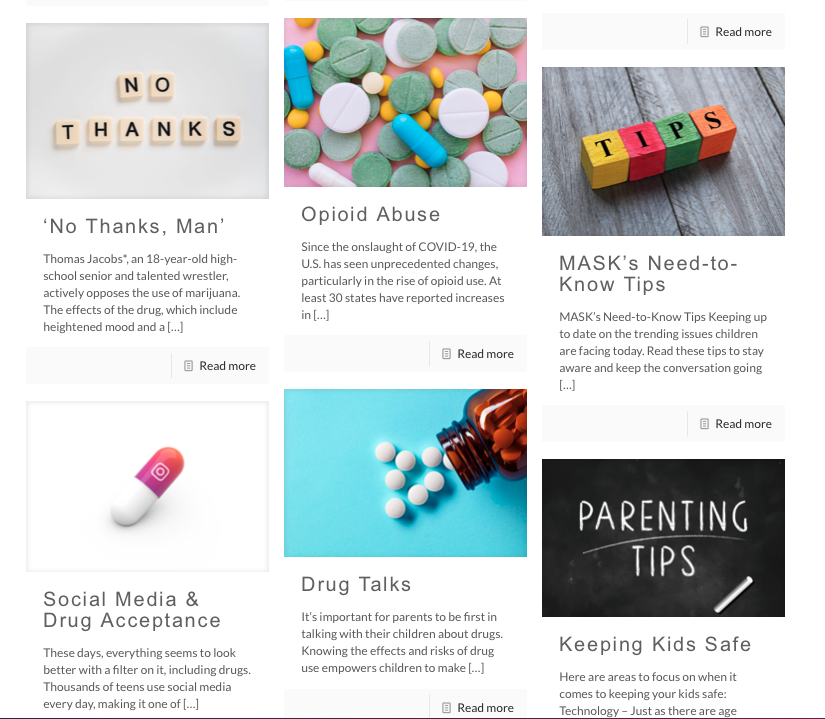
Magazines to Consider Adding to Your MASK Library
Talking about the dangers of using, misusing and abusing drugs is not a new subject for parents or children. Every parent understands the importance of educating their kids about the dangers of drugs, especially illicit, illegal or street drugs like Ecstasy, marijuana, and methamphetamines.

Whether you have an elementary, junior or high school student, here is an age-appropriate guide on how to help prevent the misuse and abuse of prescription and OTC medications by children.
Prescription Drugs
Elementary School
Kindergarten to 5th Grade
It’s an unfortunate truth: Elementary school-age kids get sick. A lot. They get tummy aches, headaches, fevers, colds and all sorts of nasty bugs. As parents, our automatic response is to find a way to make our children feel better, so we turn to prescription or OTC medications to help ease their pain. We, the responsible adults, read the label on the bottle, and administer as directed.
Children ages 5 to 11 are very susceptible to imitating the behaviors of adults. When a child sees an adult taking a pill to make them feel better, they see this as good or normal behavior. The behavior of taking a pill to feel better, however, sends two unintended messages. First, children recognize and associate feeling ill as a negative experience that can be fixed by taking a pill, which leads to the second message that it is OK, normal and safe to take prescription or OTC medications. These unintended messages are subtle, but powerful.
These days, kids are surrounded by subtle, but powerful messages about prescription and OTC medications, thanks to ads they see on TV and the adults in their lives taking medicine to feel better. But then, we sit them down and talk about the dangers of using drugs. The mixed message that one drug is safe and another is not can be very confusing for children because abstract reasoning and cognitive flexibility (the ability to see the “gray” area between good and bad) are not yet fully developed.
 Child reading list
Child reading list
“Charlie and the Curious Club: Candy or Medicine?” by Erainna Winnett
“What Are Drugs?” by Gretchen Super
“My Big Sister Takes Drugs” by Judith Vigna
 Parent reading list
Parent reading list
“Prescription Pill Drug Abuse: How to Deal With an Addict Teen, Teenager, Adult Child, Friend or Family Member Who is Addicted to Medications” by Grace Child
“How to Raise a Drug-Free Kid: The Straight Dope for Parents” by Joseph Califano Jr.
“Mother’s Checklist of Drug Prevention” by Kelly Townsend and Jonathan Scott
 Signs & Behaviors
Signs & Behaviors
- Increased interest in pill bottles, medications that parents are taking
- Mimics pill-taking behavior or asks to take medicine
- Asks for medicine when he has a stomach ache or headache
- Asks about medication commercials they see on TV
- Asks questions about specific drugs like Ritalin, Adderall, Tylenol, Advil or other popular OTC medications
- Understands and uses complex words for medicine that seem developmentally inappropriate or too advanced
- Exhibits risk-taking behaviors that do not decrease after behavioral intervention
- Acts impulsively and does not respond to behavioral intervention
- Difficulty with problem solving, wanting an easy solution
- Poor frustration tolerance
 What you can do
What you can do
- Educate your child on the difference between use and misuse of prescription and OTC medications.
- Talk to him about the specific reason for taking a medicine. Avoid saying “feel better,” but instead use words like “treat” or “cure.”
- When administering medicine, talk to him about the prescription, read the label together, and explain the medicine is only for him and that no one else is allowed to take it.
- Develop a list of safe people who can give your child medicine. Review the list regularly, or more frequently if the child is ill or has an ongoing prescription (for conditions like ADHD or if he is chronically ill).
- Encourage healthy habits such as exercise, drinking water and eating healthy to prevent illness.
- Explain that medicines should only be taken when sick or hurt, and that otherwise, drugs can be harmful.
- Provide education on tobacco, alcohol and illicit drugs, and compare them to OTC and prescription medicines for older children.
- “Since you have the flu right now, you are taking medicine to make the body aches, pains and fever go away. Do we take medicine when we are feeling well?”
- “Who is it safe to take medicine from? We only take medicine from Mom, Dad, the school nurse and (list of safe people). We do not take medicine from our coaches, teachers, friends, strangers or anyone else that is not on the safe list.”
- “Here is what alcohol and tobacco look like. Here is what medicine looks like. Here is how they are the same, and here is how they are different.”
- “It is important to remember that it can be dangerous to take medicine on your own. Always take your medicine with a trusted or safe adult.”
Prescription Drugs
Junior High
6th to 8th Grade
In middle school, kids are trying hard to fit in with their friends. They are developing a sense of autonomy, testing limits in riskier ways, and are exposed to new and varied experiences.
Middle school kids are more likely to be offered prescription or OTC medications because the drugs are easy to obtain. And because the drive to fit in is so strong, kids are easily tempted into doing what they think other kids are doing.
Saying no to trying something they perceive as normal—simply because other children are doing it—is not the easiest choice and typically not a young person’s first reaction. Additionally, if he has been around adults who take medications, he may perceive that using and misusing prescription or OTC medications is not dangerous. In fact, most kids in middle school say that it was relatively easy to obtain prescription or OTC medications because it was readily available in their parent’s medicine cabinets.
Middle school kids are also coping with intense emotions and changes in appearance. These changes can cause mental turmoil that is hard to tolerate. Kids with poor coping skills and low frustration tolerance might be looking for an easy way to feel better quickly. Kids who turn to medicine and drugs as a way to cope are setting up a destructive pattern that may carry into adulthood, which is why prevention is so important. Teaching them effective, reliable coping skills is the healthiest prevention tool.
 Child reading list
Child reading list
“I’ve Got This Friend Who: Advice for Teens and Their Friends on Alcohol, Drugs, Eating Disorders, Risky Behavior and More,” by KidsPeace
“Go Ask Alice” by Anonymous
“The 6 Most Important Decisions You’ll Ever Make: A Guide for Teens” by Sean Covery
 Parent reading list
Parent reading list
“Not All Kids Do Drugs: Lessons in Drug Prevention” by Kelly Townsend and Jonathan Scott
“Slipping Away: Complete Parent’s Guide to Recognizing Teen Drug Experimentation and Abuse” by Jennifer Kobuki
“Growing Up Drug Free: A Parent’s Guide to Prevention” by the U.S. Departments of Education and Justice
 Signs & Behaviors
Signs & Behaviors
- Dramatic changes in appearance, attitude, relationships, grades, interests, hobbies, diet and/or sleep
- Increased interest in drugs, alcohol and tobacco
- Missing medicine from your cabinets
- Refills on a prescription that were not called in by an adult
- Sudden and intense anger outbursts
- Lying or stealing
- Missing money
- Reports from relatives of missing medications
- Low frustration tolerance
- Lack of problem-solving skills
- Poor relationship skills
- Impulsivity
- Poor decision-making skills
 What you can do
What you can do
- Store medication in a secure place away from children.
- Dispose of expired or old medication appropriately.
- Develop a plan with your child on how to say no when they are offered any type of substance. Role play the plan with your children often.
- Educate him on drug use and abuse, how to read prescription and OTC medication bottle labels, and the dangers of using drugs that are not prescribed to him.
- Learn about the effects of prescription and OTC medications on the body.
- Be prepared to answer questions he may ask about your own use of medications.
- Establish clear rules and consequences for abusing medications.
- Focus on health and well-being by helping your child establish future goals, then link how the negative consequences of medication abuse—such as getting arrested or going to rehab—will prevent him/her from reaching their goals.
- “What do you know and understand about prescription drug use or over-the-counter medication use?”
- “If you are ever offered any type of medication—prescription or otherwise—at school or by a friend, what do you plan on doing?”
- “Here are some ways to say ‘no thanks’ when you are offered prescription medication. Let’s practice:
- “No, thanks. My parents would kill me if they ever found out.”
- “No, thanks. It’ll make me too tired to get all this homework done.”
- “No, thanks. I have to be at swim practice, so I can’t be tired and out of it.”
- “No, thanks. If I test positive on a drug test, I would get kicked out of _____.”
- “Why do you think the doctor prescribed this medication to you? How long are you going to take it? How often are you going to take it? What will we do with any leftover medicine?”
Prescription Drugs
High School
9th to 12th Grade
In the United States, up to 2,500 kids ages 13 to 17 misuse or abuse a pain reliever every day. Pain relievers like hydrocodone or oxycodone are surprisingly easy to obtain for kids in high school. This new trend, known as “pharming,” is when teens misuse prescription and OTC medications for recreational use.
Chances are, your high school student has been offered or has tried a variety of drugs, medications, tobacco and alcohol. Not only is a family’s medicine cabinet an easy place to find these drugs, but they’re also easy to find online.
Appropriate and early education about the dangers of misuse is one of the most powerful ways of preventing prescription and OTC medication abuse. In a recent survey, only 14 percent of high school kids said their parents had spoken with them about the dangers of prescriptions and OTC medications. Additionally, many kids and parents believe that the use of prescription medication is not as dangerous or addictive as using street drugs.
Education about the misperceptions of prescription and OTC medications is an important step parents can take to keep their high school kids healthy. Up to 42 percent of kids are less likely to misuse prescription and OTC medications when parents or trusted adults talk to them about it.
Teens are developing relatively stable coping habits that will carry through their early adult years, so teaching healthy coping skills, strong problem-solving skills, and non-aggressive refusal skills will be vital to helping them avoid the pitfalls of prescription medication use or misuse.
 Teen reading list
Teen reading list
“Crank” by Ellen Hopkins
“Glass” by Ellen Hopkins
“Fallout” by Ellen Hopkins
 Parent reading list
Parent reading list
“Where’s the Party?: Lessons in Drug Prevention: The How-To Party Protocol Book for Parents and Teens” by Kelly Townsend and Jonathan Scott
“Beautiful Boy: A Father’s Journey Through His Son’s Addiction” by David Sheff
“Teens Under the Influence: The Truth About Kids, Alcohol and Other Drugs: How to Recognize the Problem and What to Do About It,” by Katherine Ketcham
 Signs & Behaviors
Signs & Behaviors
- Dramatic change in appearance, behavior, attitude, relationships, grades, interests, hobbies, diet and/or sleep
- Increased interest in drugs, alcohol and tobacco
- Missing medicine from your cabinets
- Refills on a prescription that were not called in by an adult
- Sudden and intense anger outbursts
- Lying or stealing
- Missing money
- Reports from relatives of missing medications
- Secretive use of the computer
- Low frustration tolerance
- Lack of problem-solving skills
- Poor relationship skills
- Impulsivity
- Poor decision-making skills
- Lack of clear goals
Low or absent motivation
Lack of drive to accomplish tasks
 What you can do
What you can do
- Keep the lines of communication open. Ask specific questions about the social atmosphere at school, their friends’ hobbies and interests, and the school’s attitude about partying, drugs and medications.
- Develop, model and maintain a family plan about OTC and prescription medication use, storage and disposal. Monitor the medication supply so you can note any missing medication.
- Teach the hard facts associated with prescription and OTC medication misuse. Visit sites like SAMHSA.gov or DrugFree.org and explore the information together.
- Discuss the consequences of medication misuse and how it negatively impacts driving, academic performance and physical condition. Talk about the impact it would have on their future, such as not being able to go to college, earn scholarships, or compete in collegiate sports.
- Monitor Internet usage at home to determine if they have been buying drugs online or exploring sites where prescription medications are available.
- “I know you are going to a party tonight. I hope you have fun, but remember that pharming, drinking and using drugs are not healthy choices. Not all the kids at the party will be using. Hang out with these kids so you’re not tempted to try something that could hurt you and your future.”
- “You are going to have to make a lot of hard choices in high school, probably including being asked to try prescription medication like oxycodone. What do you know about prescription medication use?”
- “I know people talk a lot about the dangers of using drugs, but how much do you know about over-the-counter and prescription medication use? What is the difference between drugs, prescription medication and over-the-counter medication?”
- “Is it ever OK to share medicine with a friend? Is it ever OK to take someone else’s medication?”
Prescription Drugs
College
Whether your young adult child is living at home or on campus, the transition to college comes with a lot of independence, increased exposure to riskier situations, and a higher degree of stress.
At this age, using medication becomes a much more independent choice. Rather than going to an adult when she is sick, your child will be able to go to the drugstore and buy her own medications. Teach your child how to make informed choices that align with a healthy lifestyle and are based in scientific evidence, which will help her make better choices about medication.
When it comes to using stimulant drugs to stay awake for studying, pain medication to recover from sports injuries, or OTC drugs to deal with common ailments, teaching young adults how to responsibly take medications is one of the best prevention options parents have. Talk to her about medication before she leaves for college, educate her on which OTC medications to use for certain illnesses, discuss medication allergies, and address peer use of medication, including sharing prescription medication and the dangers of misusing prescription drugs.
Address the misperception that prescription drugs are safe or are OK to use to get high. Talk about the thin line between using and misusing medications. Explain the negative outcomes that could occur with misuse of prescription and OTC medications on her long-term goals, such as trying out for collegiate sports, earning scholarships, and getting a job.
 Signs & Behaviors
Signs & Behaviors
- Increased use of and/or reliance on medication
- More money spent on medication
- Avoidance of drug testing as required by potential employers, recruiters or scholarship boards
- Physical changes associated with abusing medication
- Changes in the types of individuals your child normally spends time with
- Changes in relationships, mood, behavior
- Taking higher doses of a medication than what has been prescribed
- Doctor shopping: going from one doctor to another to obtain more prescriptions for a medication
- Losing prescriptions
- Misuse of money, frequent requests to borrow money, and unexplained accounting of money
 What you can do
What you can do
- Provide education on misuse of prescriptions and OTC medication.
- Teach how to appropriate and safely handle (store, use and dispose of) prescription and OTC medications.
- Show how to read labels, buy appropriate medication, and take medications.
- Talk about your child’s health, choices, goals and the current events in her life. Reach out frequently even if she doesn’t respond all the time.
- Teach how to deal with stress in healthy ways, such as problem solving, taking a break, learning how to say no, and balancing life and work.
- Discuss the negative impact of prescription medication misuse. Give clear and explicit examples to show how they could lose their scholarship, get arrested, or be fired as a result of medication abuse.
- “You are going to encounter a lot of things in college, among them, students who use stimulants to help them study. What are the risks and benefits of this choice? What would you do? How would your choice help you meet your long-term goals and keep you healthy and safe?”
- “Many of your peers may be using prescription pain relievers to get high or deal with anxiety. What would you do if you begin to feel stressed out because of your workload? Would you use drugs or medications? Who would you go to? How would you manage your use of the medication?”
- “College is going to expose you to all kinds of new ways to have fun, including some dangerous things like using prescription drugs to get high. What would you do in those cases? It may seem safe, but do you know that you would test positive on a drug test if you ever took prescription drugs?”

